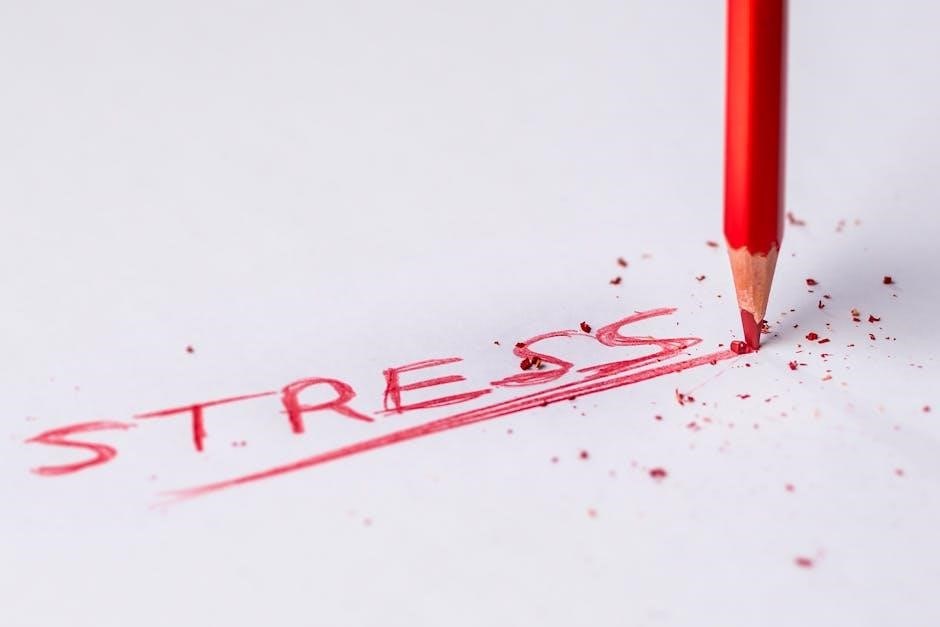The AP Psychology textbook PDF is a comprehensive resource designed for students preparing for the Advanced Placement Psychology exam. It covers key topics in psychology, including scientific foundations, biological bases of behavior, and sensation and perception, aligning with the AP curriculum. The PDF format enhances accessibility, allowing students to study efficiently and effectively. This digital version is particularly useful for self-study and quick reference, making it an essential tool for achieving success in the course.
1.1 Overview of the Textbook
The AP Psychology textbook PDF is a comprehensive guide covering core topics like scientific foundations, biological bases of behavior, and sensation and perception. Designed for AP students, it aligns with course requirements and provides in-depth explanations. The 4th edition offers updated content, making it a valuable resource for studying. Its digital format enhances accessibility, allowing easy navigation and searchability, which is particularly beneficial for self-study and exam preparation.
1.2 Importance of the PDF Format for Students
The PDF format of the AP Psychology textbook offers significant advantages for students. It provides portability, allowing easy access on various devices. The digital version enhances searchability, enabling quick location of specific topics. Additionally, the PDF supports study tools like highlighting and note-taking, fostering active learning. Its accessibility is particularly beneficial for students who prefer digital resources or require flexible study options, making it an indispensable tool for academic success.

Key Features of the Myers Psychology for AP Textbook
The Myers Psychology for AP textbook features a structured approach, covering scientific foundations, biological bases, and sensory processes. It emphasizes learning outcomes and focus areas to meet AP course requirements, ensuring comprehensive preparation for students.
2.1 Structure and Organization
The Myers Psychology for AP textbook is organized into nine units, each focusing on core areas like scientific foundations, biological bases, and sensory processes. The structure aligns with the AP curriculum, ensuring comprehensive coverage of essential topics. Each chapter includes clear sections and learning objectives, making it easy for students to navigate and focus on key concepts. The updated edition reflects new course content, enhancing its relevance and effectiveness for AP preparation.
2.2 Learning Outcomes and Focus Areas
The textbook emphasizes essential concepts and skills for AP Psychology, focusing on scientific inquiry, research methods, and application of psychological principles. It aligns with the AP course framework, ensuring students master key topics like biological bases, sensation, and perception. Each unit incorporates learning objectives, fostering critical thinking and exam preparation. The latest edition integrates updated content, reflecting current research and curriculum requirements, to enhance student understanding and readiness for the AP exam.
Editions of the Textbook
The AP Psychology textbook is available in multiple editions, including the 3rd and 4th editions. Each edition aligns with the AP course curriculum, providing updated content and resources. The 4th edition introduces new topics and refines existing material, while the 3rd edition remains a reliable resource. Students can access these editions in PDF format, ensuring flexibility and convenience for studying and exam preparation.
3.1 Differences Between the 3rd and 4th Editions
The 3rd and 4th editions of the Myers Psychology for AP textbook differ in content organization and updates. The 4th edition aligns with the nine-unit AP curriculum, incorporating new research and topics. It enhances digital resources and study tools. The 3rd edition, while still relevant, lacks the latest course content and structure. Students are advised to use the 4th edition for the most accurate preparation, especially for the updated AP exam format.
3.2 Updates in the Latest Edition
The latest edition of the Myers Psychology for AP textbook includes 100% of the new AP course content, organized into nine units. It features enhanced digital resources, updated research findings, and modernized examples to engage students. The textbook also offers improved graphics and visual aids to clarify complex concepts. These updates ensure the material aligns with current AP curriculum requirements, providing students with the most relevant and effective study resources.

Accessing the AP Psychology Textbook PDF
The AP Psychology textbook PDF is widely available on educational platforms, online libraries, and course websites, offering students convenient access to study materials anytime, anywhere.
4.1 Sources for Downloading the PDF
The AP Psychology textbook PDF can be downloaded from various educational platforms, including Google Drive links shared by instructors, online libraries, and course websites. Additionally, platforms like Better World Books and specific educational forums provide access to the PDF. Some sources may require registration or subscription, but many are freely available to support student learning and preparation for the AP exam.
4.2 Platforms Offering the Textbook
The AP Psychology textbook PDF is available on platforms like Google Drive, educational forums, and online libraries. Websites such as Better World Books and course-specific portals also provide access. Additionally, some instructors share links to the PDF through learning management systems or class websites. These platforms ensure that students can easily access the material, supporting their studies and preparation for the AP exam.
Chapter Overview
The textbook covers foundational topics like scientific methods, biological bases of behavior, sensation, perception, and states of consciousness, providing a structured approach to understanding psychology.
5.1 Scientific Foundations of Psychology
This chapter explores the scientific methods and historical roots of psychology, emphasizing research techniques, theories, and the role of ethics in psychological studies. It provides a solid foundation for understanding the field’s development and its evidence-based approach, essential for AP students preparing for exams and further studies in psychology.
5.2 Biological Bases of Behavior
This chapter focuses on the biological aspects influencing behavior, including the brain, nervous system, and neurotransmitters. It explores how brain structures, hormones, and genetics contribute to psychological processes and behaviors. Topics like neuroplasticity and the effects of damage to brain regions are also covered, providing insights into the biological underpinnings of human behavior and cognition, essential for understanding psychological principles in the AP curriculum.
5.3 Sensation, Perception, and States of Consciousness
This chapter explores how humans process information from the environment, focusing on sensation and perception. It discusses thresholds, sensory adaptation, and perceptual principles like Gestalt theory. Additionally, it delves into states of consciousness, such as sleep, dreams, and altered states, including the effects of substances like drugs. The section highlights the biological and psychological factors influencing these processes, providing a comprehensive understanding of human consciousness and sensory experiences.
Benefits of Using the PDF for AP Psychology Students
The PDF offers unmatched portability and accessibility, enabling students to study anytime, anywhere. Its searchability feature allows quick access to specific topics, enhancing study efficiency.
6.1 Portability and Accessibility
The PDF format ensures the AP Psychology textbook is highly portable, allowing students to carry it on devices like tablets or laptops without the bulk of a physical book. Accessibility is enhanced as students can access the material anytime, making it ideal for on-the-go studying. This convenience is particularly beneficial for those with limited space or preferring digital resources, ensuring uninterrupted learning and flexibility in study environments.
6.2 Searchability and Study Tools
The PDF format offers advanced search functionality, enabling students to quickly locate specific terms or concepts within the textbook. This feature is invaluable for efficient studying and review. Additionally, the digital version often includes supplementary study tools such as chapter outlines, practice tests, and interactive exercises, enhancing the learning experience. These resources help students focus on key areas, making the AP Psychology textbook PDF a powerful tool for exam preparation and academic success.

Supplementary Resources and Materials
The AP Psychology textbook PDF is complemented by online companion websites, offering practice tests, study guides, and interactive exercises. These resources enhance understanding and exam preparation, providing students with additional tools to master course material effectively.
7.1 Online Companion Websites
Online companion websites offer valuable resources, including interactive exercises, practice tests, and study guides. These platforms provide students with additional tools to enhance their understanding of AP Psychology concepts. Features like PsychSim and other interactive modules help reinforce learning. Access to these resources is often included with the textbook PDF, making them a convenient supplement for self-study and exam preparation. They cater to diverse learning styles, ensuring comprehensive coverage of course material.
7.2 Practice Tests and Study Guides
Practice tests and study guides are essential tools for AP Psychology students. These resources simulate exam conditions, helping students assess their knowledge and identify weak areas. Detailed answer explanations provide insights for improvement. Study guides offer focused reviews of key concepts, ensuring thorough preparation. Available online or in PDF, they complement the textbook, offering structured practice to build confidence and readiness for the AP exam. Regular use enhances retention and exam performance significantly.

Digital vs. Print: Choosing the Right Format
Digital and print formats cater to different learning preferences. Digital offers portability and searchability, while print provides tactile engagement. Choose based on personal study habits and accessibility needs.
8.1 Advantages of the Digital Version
The digital version of the AP Psychology textbook offers enhanced portability, enabling students to access the material anytime, anywhere. Features like search functionality and bookmarking improve study efficiency. Additionally, digital versions often include supplementary resources, such as interactive diagrams and online practice tests, which can aid in understanding complex concepts. This format is particularly beneficial for students who prefer a more modern and flexible learning experience.
8.2 Considerations for Print Edition Users
While the print edition provides a tactile learning experience, it lacks the portability and search functionality of the digital version. Students with the 3rd edition may find discrepancies in content and chapter structure compared to the 4th edition PDF. Additionally, the print format requires physical storage and can be heavier, making it less convenient for on-the-go study. However, some students prefer the focus and retention benefits of physical books.
Integration with AP Psychology Course Requirements
The AP Psychology textbook PDF aligns with the course curriculum, covering all nine units and preparing students for the exam. It supports learning outcomes and provides resources for understanding key concepts, ensuring a comprehensive approach to meeting course requirements and achieving success in the AP exam.
9.1 Alignment with Course Curriculum
The AP Psychology textbook PDF is specifically designed to align with the College Board’s course framework, covering all nine units of study. It addresses scientific foundations, biological bases of behavior, sensation, perception, and more, ensuring a comprehensive understanding of key concepts. The text supports learning objectives and prepares students for the AP exam by integrating relevant content and skills, fostering a deep grasp of psychological principles and their applications.
9.2 Preparation for AP Exams
The AP Psychology textbook PDF serves as an invaluable resource for exam preparation, offering practice tests, chapter summaries, and review questions. It helps students master key concepts, apply theoretical knowledge, and develop critical thinking skills. The text’s structured approach ensures readiness for both multiple-choice and free-response sections of the exam, providing a thorough review of all nine units to build confidence and competence for success on the AP Psychology exam.
The AP Psychology textbook PDF is an essential tool for students, offering comprehensive coverage of course material and flexible study options. It supports effective learning and exam preparation, ensuring students are well-equipped for success in their AP Psychology studies.
10.1 Summary of Key Points
The AP Psychology textbook PDF is a vital resource for students, offering a comprehensive overview of psychology aligned with the AP curriculum. It covers scientific foundations, biological bases, sensation, perception, and more, ensuring thorough preparation for exams. The PDF’s portability and accessibility make it ideal for efficient studying. By integrating with course requirements, it serves as an essential tool for academic success in AP Psychology.
10.2 Final Recommendations for Students
Students are encouraged to utilize the Myers Psychology for AP Textbook PDF for its portability and searchability, enhancing study efficiency. Pairing it with online resources and practice tests can strengthen exam preparation. Regularly review chapters, focus on key concepts, and engage in active learning techniques like note-taking and self-quizzing. Additionally, ensure access to the latest edition for the most updated content, maximizing success in the AP Psychology course and exam.
